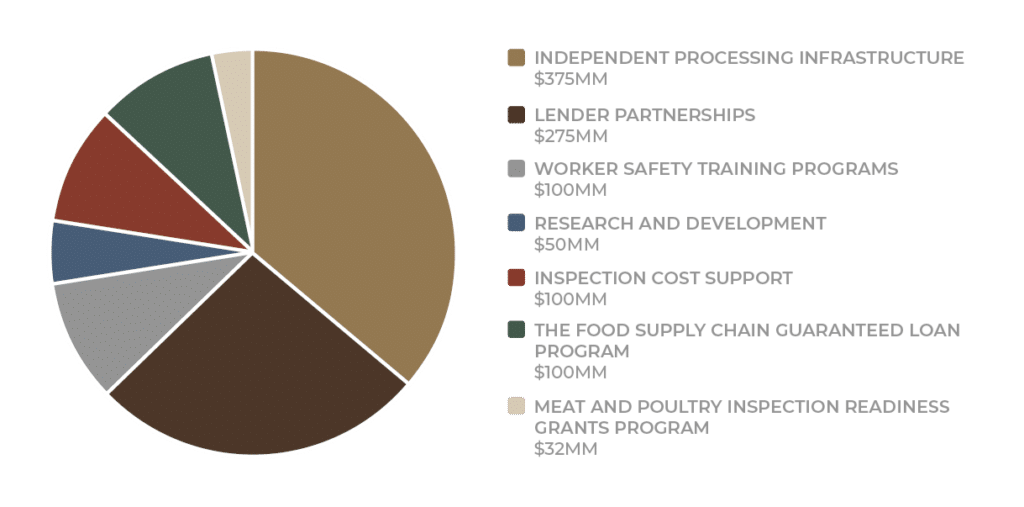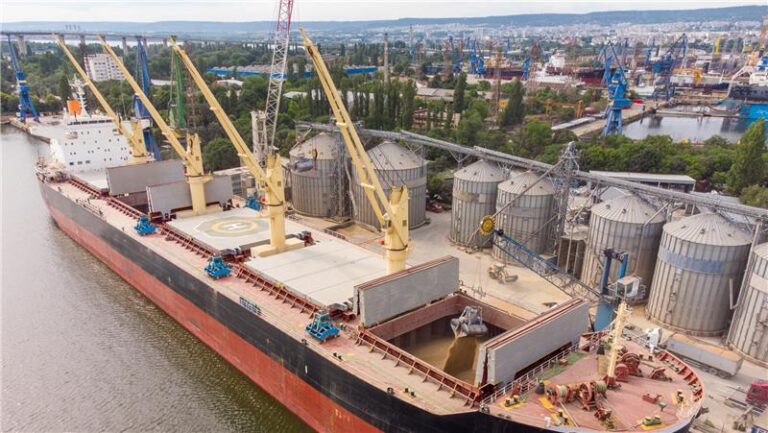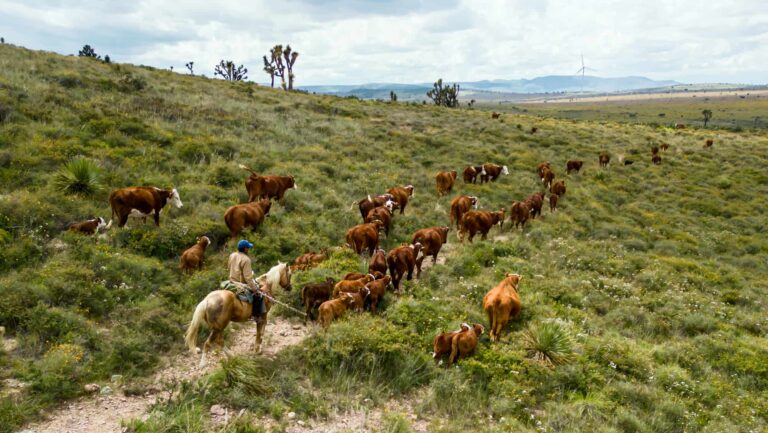Addressing Consolidation in the U.S. Meat Industry
The consolidation of the meat industry in the U.S. is something ranchers have been facing for decades. Is legislative change the answer?
When the pandemic first swept through meatpacking plants across the nation in 2020, it was a wake-up call at a legislative level that meat supply chain issues and the threat of packer consolidation could no longer be ignored.
Inventory shortages at grocery stores combined with pandemic-related plant closures led to significant backlogs for the meat industry. Supply outweighed processing capacity and many producers were pressured to sell livestock and poultry well below value—if they could at all.
Once meatpacking plants were back online and working overtime to ease the supply bottleneck, major processors generated some of their highest profit margins on record, with net margins up more than 300 percent according to a recent White House analysis.
None of this is surprising to the American rancher. However, since these supply chain disruptions, there have been significant legislative strides in the fight against the cattle and poultry industry monopolies. Lawmakers and industry leaders are working together to create a more equitable and transparent market for American ranchers and farmers moving forward. Several bills have already been introduced in 2021—but moving forward with the best solution has proven to be a challenge.
Legislative Developments to Reduce Monopolies in the Meat Industry
Following the Biden administration’s executive order to boost competition for the U.S. ag sector back in July, the USDA reviewed close to 450 comments with input regarding the best way to address meat industry consolidation. From these submitted comments, the USDA identified the four most effective ways to approach the deconsolidation of the meat and poultry industries.
- Increase the number of meat and poultry processors;
- Provide producers with opportunities to own processing facilities;
- Create more stable jobs with higher salaries for rural communities; and
- Improve health, safety, training, and wages for workers at meatpacking plants.
On January 3, 2021, the Biden administration announced an action plan to begin deconsolidating monopolies in the meat and poultry sectors with a more than $1 billion investment from the American Rescue Plan funds to expand independent meat processing capacity.
Find the full White House Action Plan fact sheet here.
Estimated Distribution of Meat Industry Consolidation Action Plan Funds

According to U.S. Department of Agriculture (USDA) Secretary Tom Vilsack, there will be “clawback provisions” in place to protect the new facilities built with this funding from falling into the hands of major meat processing companies. Ag Secretary Vilsack told Agri-Pulse that funding allocation will be focused on supporting investments in a range of small to mid-size processing facilities, both new and old.
Beyond these investments, the Action Plan also attempts to address meat industry consolidation through several types of legislative reform.
Stronger Protections Under the Packers and Stockyards Act
Building off the three actions the USDA is taking to reform the Packers and Stockyards Act, the USDA is partnering with the Federal Trade Commission (FTC) to prepare a report on how to protect new meat processors with greater access to the market and more competition.
New Online Portal Makes Reporting Anticompetitive Practices Easier
The USDA and Department of Justice (DOJ) are also partnering to make antitrust enforcement in agriculture more effective and protected, with the launch of a new portal to report potential competition law violations. The virtual portal is expected to launch in February 2022 for farmers and ranchers to report anticompetitive practices.
New Guidelines for “Product of USA” Labeling
American farmers and ranchers have been sounding the alarm on the harm of misleading food labeling practices for years. Current labeling standards allow meat raised overseas but processed in the U.S. to be labeled as a “Product of USA” which is misleading to consumers who are increasingly voting with their dollar to support American farmers and ranchers when the option is given.
Prioritizing the Passage of Proposed Meat Industry Consolidation Reform Bills
The administration’s Action Plan to deconsolidate the meat processing sector also included pressure for Congress to prioritize the passage of legislation introduced in 2021 to address meat industry consolidation trends.
- Cattle Price Discovery and Transparency Act – This bill was officially introduced to the House by Representatives Randy Feenstra and Cindy Axne in November 2021, with collaborative support from Senators Chuck Grassley, Deb Fischer, Jon Tester, and Ron Wyden. Find the one-pager summarizing the Cattle Price Discovery and Transparency Act here.
- Cattle Contract Library Act of 2021 – Introduced by Representative Dusty Johnson in October 2021 and passed by the House with overwhelming support (411-13) in December 2021. Find the one-pager summarizing the Cattle Contract Library Act of 2021 here.
Some industry experts are concerned that requiring mandatory minimum thresholds for negotiated cash trade in the Cattle Price Discovery and Transparency Act would actually lower cattle prices for ranchers.
“If you set a threshold that enforces more negotiated trade, that’s more costly to do. What that means is lower cattle prices and higher prices to consumers.”
David Anderson, Ag Economist at Texas A&M University
Rather than government-mandates negotiated cash trade, Illinois Beef Association President Dr. Paul Walker is an advocate for tying live prices to the retail side as a “cutout value”, which would provide an equitable ratio threshold packers can adhere to.
Industry Leaders Debate Solutions to the Meat Packing Monopoly
While substantial steps are being taken to introduce legislative reform that supports the deconsolidation of the meat and poultry industry, industry leaders are having a hard time agreeing on the best path forward.
- Independent processor Patrick Robinette says the action plan to address meat industry consolidation creates more opportunities for both ranchers and independent processors.
- National Chicken Council President Mike Brown called the plan “a solution in search of a problem.”
- Policy Director at the National Sustainable Agriculture Coalition Eric Deeble praised the plan, calling it a “very positive step to ensure farmers and ranchers receive fair prices.”
- North American Meat Institute President and CEO Julie Ann Potts argued that government spending will not help food price inflation because it does not address the root problem of labor shortages in meat and poultry processing sectors.
- American Farm Bureau Federation President Zippy Duvall expressed support for bipartisan collaboration to strengthen the Packers and Stockyards Act and improve Product of USA labeling guidelines, however, the AFBF president does not support mandatory cash sales.
- R-CALF USA CEO Bill Bullard said that although the Action Plan should help increase marketing channels for ranchers, he remains skeptical that the plan’s initiatives will lead to “decisive enforcement action.”
AgAmerica Supports a Fair Market for American Cattle Ranchers
In the wise words of North Carolina independent beef processor Patrick Robinette, “we’ve got to celebrate that we are at least having the conversation, but we don’t need to back off of anybody.”
The Senate Ag Committee will likely hold additional hearings on the proposed pieces of legislation sooner rather than later and it is critical that the voices of American farmers and ranchers are a central part of the conversation.
Fortunately, U.S. meat and poultry producers aren’t completely reliant on state and federal funds. Across the nation, more and more American ranchers are taking meat industry deconsolidation into their own hands and starting independent meat processing companies with funding through private financial institutions.
As a nonbank agricultural land lender, AgAmerica can support farmers and ranchers in leveraging their land equity and secure flexible working capital to level up their operation without the headaches of excessive red tape or annual renewals.
Learn what it’s like to have a lender committed to a thriving future for American agriculture in your corner and get verified today.






